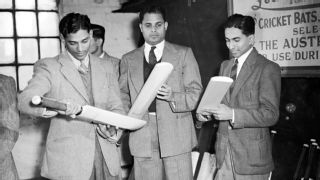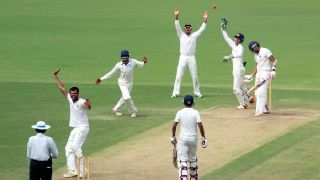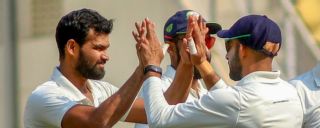|
Aditya Sarwate is running because he's pumped. Aditya Sarwate is roaring with that primal sound athletes make when they've scored a goal, hit a winner, made a breakthrough. Aditya Sarwate is mobbed by his team-mates. Aditya Sarwate is ecstatic because he has just taken out the opposition's most dangerous batsman, Cheteshwar Pujara. And in the second innings, he's going to do that whole routine again. Only this time, he'll take even less time to send Pujara back. It's been a miracle season for Sarwate. At the start of the Ranji Trophy final, a VCA official said, almost wistfully, "He would have had 50 wickets coming into this match, but couldn't bowl in the semi-final." At the end of the tournament, Sarwate had 55 wickets at 19.67, with a career-best match haul of 11 for 157 in the final. All this while being good enough to score 354 runs at 29.50, with a century. Man of the final, and if the award were given, then Man of the tournament too, surely. Sarwate has two tattoos on his arms - one of the Gayatri mantra and another that says "Carpe Diem". Faith and a can-do attitude, two key ingredients in his rise. Cricket runs in his family. Grand-uncle Chandu Sarwate played nine Tests for India and was a legend for the erstwhile Holkar team, playing alongside the likes of CK Nayudu and Mushtaq Ali. Grandfather Shyam Sarwate has been a renowned Marathi radio commentator. Father Anand played for Nagpur University and Punjab National Bank. But when Aditya was three years old, his father met with an accident that left him needing a wheelchair for the rest of his life. Aditya had no siblings, and mother Anushree juggled the tasks of bringing up her son, keeping her job at the Syndicate Bank going as the family's bread-winner, and looking after her husband.  Given that background, it takes an uncommonly strong will to forge ahead with a career in cricket. Luckily for the young Sarwate, his family's support was absolute. "If you don't face tough circumstances, you tend to get complacent and start taking things for granted," he reflects. "Obviously it was tough but more than me, my mother has made a lot of sacrifices and faced a lot of struggle. Not even once did she discourage me from playing cricket. When I grew up, I started helping her out in household chores and looking after my father whenever I could. But all credit to her. She did everything at home, gave me an upbringing, looked after my father, and even managed her job. "I don't have any idol as such [in cricket] but I have seen my mother's sacrifices. I always think if she can work so hard at this age, why can't I do the same? Cribbing over small issues is not worth it. That's what I have learned from her, so I consider her my idol." Sarwate's maternal grandparents lived with him in a joint family, so that helped, but his father still needs constant care, because although he can converse, he can't get off his wheelchair. "He follows my cricket closely," Sarwate says. "I am sure he will be very happy today. He was very pleased last year too." Last year, Sarwate wasn't part of the Vidarbha XI in every game, but in the six he played, his batting average was 47.14 and his bowling average 16.65. Those six games included all the knockout matches, in each of which he played a significant hand with either bat or ball. Rajneesh Gurbani's sensational exploits in the semi-final and final meant Sarwate flew under the radar, but his team had noticed, and come 2018-19 he was a guaranteed starter. Playing the same number of matches as your age is commendable if you're a teenager. If you're 29, it's a little underwhelming. If you look at Sarwate's record - first-class batting average of 31.45 and bowling average of 18.46 - it's bizarre. As in life, so too in cricket, and Sarwate had to battle the odds to cement a spot in the Vidarbha XI. "I never thought about it. I was never desperate to play first-class cricket - even now I am not desperate to play at a higher level," Sarwate says. "I prefer to live in the moment. Yes, it does get to you when the wait for Ranji selection gets longer, it's human nature. But you can only keep performing, wait for an opportunity, and then grab it." Carpe Diem.  He began life as a batsman who could bowl part-time, taking the game seriously from the Under-19 level onwards. But even when he had broken into the Vidarbha side in 2015, he was, by his own admission, "focussing more on my batting". Paras Mhambrey, then Vidarbha's coach, counselled him to work on his bowling, and Sarwate himself figured out he needed to do just that. "I thought that since we have been playing with professionals who are primarily batsmen, there wasn't much scope to play in top six. If I could focus more on my bowling, I could establish myself as an allrounder." On the biggest domestic stage, he showed he retained both skills. In Vidarbha's second innings, he walked in at 105 for 6, effectively 110 for 6, and pulled the team to 200 all out. While bowling, he had executed a well-thought-out strategy precisely to nail Pujara in the first innings. ALSO READ - How Vidarbha plotted Pujara's downfall But Sarwate would still have to bowl to Pujara once more. The man, after all, had made unbeaten scores of 67 and 131 in the quarter-finals and semi-finals to steer Saurashtra through tricky fourth-innings run-chases. In the first innings, Pujara had been drawn into an edge partly because the ball turned more than he expected. He would be vigilant enough to not let his hands follow the ball a second time - which is when Sarwate unleashed the one that went straight on. Delivered with the same action, same grip, same angle. Pujara naturally enough played for the turn, and was rapped in front. Game and set Vidarbha, and soon the match too. "I keep changing where I hold the shiny side of the ball," Sarwate says. "Many a time, if you hold the shiny side on the right-hand side you get turn (away from the right-hander), if you hold it on the left-hand side towards the palm, the ball goes inwards," Sarwate says. "So I keep mixing it up so that the batsman doesn't understand when it's going to turn and when it will go straight. "[Pujara's] wicket is the biggest achievement for me. I am glad I could do it twice. If he had settled, we would have had to work really hard to win." For Sarwate, that would have just been one more hurdle to clear.
|

